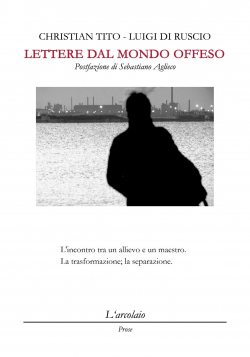Editoriale Poemata
by Francesca Del Moro
In the selected poems, the thousand blue bubbles rise like a curtain to reveal summer scenes lost in our memory but they also carry a universal metaphorical value. In the polished “coming-of-age” verses by Alba Gnazi, whose imagery is so rich and precise that it brings back familiar episodes re-lived with both pain and tenderness, we almost hear the song of the cicadas reverberating. The same song that Elena Latini looks for, in search for a handhold, while her eyes wander lost and fascinated between the vastness of the sky and the sea. And precisely the sea is at the core of the elaborate metaphors with which Rita Stanzione evokes love, starting with a title that reminds us of one verse of the song Gli arpeggi by I camillas. Rino Gaetano’s Aida and Mio fratello è figlio unico may be the inspiration for the poem by Samuele Larocchia, in which water offers a shelter allowing to move one’s gaze away from an unbearable reality, whereas a brother and alter ego raises his head with the courage of simplicity. Finally, in the nursery rhyme by Veronica Liga the blue bubbles are the waves’ spurts, metaphor of the course of life, rapid moments that flow through us, moments to enjoy and let go, without stopping to wait for them.
The sea you mean to me
by Rita Stanzione
Your grey eyes
before the night
The longest sea
of unknown words
pronounces me
undertow
changing name:
trembling in the hair
Salty voice. Happened
and happening rhythm
in a hip only,
a veer - as if
it wasn’t true
You are a windy sign
wing and peak, to the naked throat
You are like I cry at the bottom of the laugh
like blowing up sails
Sense of the sea, you are, stronger
that doesn’t end
and is already missed
I’ll climb down and look at the sky
by Elena Latini
I’ll climb down and look at the sky
spreading above the hill.
Where are the cicadas?
And yesterday’s sea,
the big sea...
I could tell you
by Alba Gnazi
I could tell you
about summer cases that
set cicadas in memories - I remember
absurd trifles and vocal hues that
don’t resound anymore. In which moment
of August the rain
can’t wait anymore?
My father foamed azures from
the storms tuned by my mother - he’s got hands
torn by time, my father,
by time and too much love - I remember
myself sitting, quietly listening:
cicadas in the throat
they were quiet too,
until the final silence.
1987: the old man didn’t grant himself
another summer; my father removed the cloths from the garden,
my mother sobbed
on my first becoming, I
translated it all in teenage
scores and continued
to walk.
The head underwater
by Samuele Larocchia
Some carried flags,
some carried kites,
I couldn’t stand
this exploitation of the wind
and put my head underground.
Some used to dig money,
others dag out shelters,
I couldn’t stand
the noise of the shovels
and put the head underwater.
It was then
that my only brother
(younger, beloved, innocent)
couldn’t hold it.
WAVES
by Veronica Liga
The waves come and go,
let them flow…
A сold wave slaps you –
let it pass by
and don’t to look behind it…
A warm wave caresses you –
kiss it on the fly
and don’t hang on…
Let them flow…
Let them flow…
And do not sit and wait for them
in dry canals.
LETTERE DAL MONDO OFFESO
“Talk about my books, should the opportunity arouse. I will send all my unpublished writings to Feltrinelli, on Monday morning I will go to the hospital. […] In my poems lies my resurrection.” These are the last words that Luigi Di Ruscio wrote to his friend Christian Tito, a month before he died on the 23rd February 2011. Previously, the two poets had been regularly exchanging emails for one year and a half, since Christian wrote Luigi on a wave of enthusiasm for L’ultima raccolta, which he had bought at the Libreria del Mondo Offeso in Milan. Their letters, torn between the desire to meet in person and the will to found their relationship only “on the vehicle used by poets to attempt art: the word”, are reproduced starting from this valediction and the chronological order is replaced by thematic groupings that allow a better exploration of the cruxes of this master-disciple relationship. Two roles that prove to be dual since the beginning: if the eighty-year-old Di Ruscio, one of the most important contemporary Italian poets, is perceived as an artistic model and the permanent nourishment of the young writer’s dream, the latter takes on in turn – resolutely and fervently – a guiding role. Thanks to his intimacy with Luigi, Christian offers the reader a precious insight on his personality and at the same time he grants the old poet the confidence he needs to head towards his own “resurrection.” The letters, edited in order to allow the engaging flow of the epistolary novel, sometimes make room for poems as an invitation to investigate the works of both authors, where poetry and life are intertwined, marked by a conflict between a stubborn confidence, the steadfast love (for their wives, above all) and the awareness of living in an “offended world.” The calling to writing, in particular, is both obstructed and inspired by their daily working life: the counterparts of Christiania – the factory that produces nails “of which I will never know who they are going to crucify”, where Di Ruscio has worked for forty years after having immigrated to Norway – are the chemist’s where Christian has to cope with the power of multinational corporations, and Ilva, another hellish factory that gave a job but also death to the father of the young poet. But the most interesting aspect of the book is that it perfectly outlines the struggle involved in the attempt to be a writer, which is nevertheless imbued with hope: as the doubts, the frustrations, the efforts to be acknowledged come to the surface, it becomes clear that poetry is still the most genuine and profound key of interpretation of our times: it doesn’t matter that you don’t read poems / because poetry will read you all (Christian Tito).
Christian Tito and Luigi Di Ruscio, Lettere dal mondo offeso, L'Arcolaio 2014

